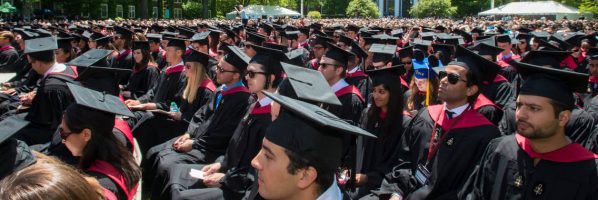Comparing The U.S. News Full-Time and Online MBA Rankings

When it comes to business school rankings, U.S. News & World Report issues one of the most comprehensive annual lists. The annual rankings includes separate lists for the “Best Business Schools” and the “Best Online MBA Programs,” but deciding which format is right for you can still be tricky. Continue reading…
Hiring Practices Examined in New UMD Smith Research

Did you know that about half of job openings go to friends and acquaintances of high-powered individuals within an organization? We’ve always been told it’s about who you know, not what you know, after all.
Yes, referral-based hiring come across as a little sketchy, but many human resource departments actually encourage the strategy. But despite that, a research paper co-written by two Robert H. Smith School of Business scholars shows that hiring managers invite harsh moral judgments when they give jobs to friends and acquaintances referred to them.
Entitled “Compromised Ethics in Hiring Processes? How Referrers’ Power Affects Employees’ Reactions to Referral Practices,” the author’s note; “When the referrer is powerful, observers will believe the hiring manager is attempting to increase the referrer’s dependence on him/her, ultimately resulting in future benefits for the hiring manager.”
The research was authored by UMD Smith professor Rellie Derfler-Rozin, Ph.D. candidate Bradford Baker, and Harvard Business School professor Francesca Gino and published in the Academy of Management Journal. They found that hiring managers appear self-serving and unethical to others in the organization, which can disrupt workplace chemistry and even hurt support for the new hire.
“Referral practices can be seen as morally murky territory in which special interests and the exchange of favors dominate, above and beyond merit,” the authors wrote.
However, they also found that referral-based hiring practices have advantages: Not only do referrers usually have inside information about the applicants they recommend, but they also have incentives to train, mentor, and monitor them as well. Additionally, new hires want to perform well so they don’t embarrass the referrers who put trust in them.
Ultimately, the research does not suggest that companies should stop referral-based hiring, but that hiring managers and the people who give referrals should be mindful of the power dynamics involved.
“One suggestion could be creating a system in which referrers are anonymous, at least for an initial period of time pre and post-hire, while simultaneously providing enhanced transparency regarding the reasons for the referral,” the authors write.
You can read the entire research paper “Compromised Ethics in Hiring Processes? How Referrers’ Power Affects Employees’ Reactions to Referral Practices” here.
Which Graduate Business School Students Have The Highest GMAT Scores?

Along with required work experience and undergraduate prerequisites, prospective MBA students also look at the average scores on the Graduate Management Admission Test (GMAT) for a certain school they are interested in applying to.
According the Graduate Management Admission Council, the exam is used as part of the admissions process for more than 6,100 graduate programs around the world. A GMAC study found that 261,248 GMAT exams were taken by prospective MBA students during the 2016 test year. The report also shows that less than 30 percent of scores were 650 or higher. The GMAT has a maximum score of 800. Continue reading…
Harvard Offers New Executive Education Program

Harvard Business School will now be offering a new executive education program titled, Senior Executive Leadership Program- India. The program will focus on the growing economy of India and the skills and knowledge that senior executives will need to be successful in the global environment. The program is taught across a series of modules in Boston at the Harvard campus as well as in Mumbai. The program will run from July 2016 to June 2017. Students will participate in online learning components through the HBX Live Virtual Classroom in between the modules.
The program’s curriculum will help executives to expand their leadership skills. Program participants meet in four modules- two in Boston and two in Mumbai. The first modules, held in Boston will focus on how leaders must look at their business critically and how create a solid business strategy in a global business environment. Students will cover strategy, leadership, innovation and globalization. In the second module, held at the Taj Lands End in Mumbai, will focus on competing in a global environment, how to create customer value and competitive advantages.
Harvard Offers Credit for HBX CORe Program

Harvard Business School is now offering college credit to students who complete the HBX Credential of Readiness (CORe) online program. Students who complete the program starting in January, will receive eight undergraduate education credits. The credits will be given through the Harvard Extension School. HBX CORe, is an online program designed to help students to become familiar with business fundamentals. This is a three-course 100 percent online program. The program is ideal for those who do not necessarily have a business background but plan to move in to more business-related or desire to learn more about the language of business.
The Harvard Extension School is Harvard University’s school for continuing education that provides part-time students with access to Harvard programs. The CORe program is offered of credit in collaboration with the Harvard and Extension School and HBX, Harvard Business School’s online initiative. HBX CORe was launched in 2014 and has had more than 5,000 program participants since its beginning.
Harvard Students Give Advice for International Students

Harvard Business School MBA students Esme O’Neill-Dean and Ibraheem Fahal recently shared some advice for international students who are looking to apply for the MBA program at Harvard. The two students shared several pieces of advice for applying to the MBA program at the Harvard Business School as an international applicant. Harvard welcomes students from all different nationalities and prides itself on its diverse group of students enrolled in its programs.
Out of the 936 students enrolled in the Full-Time MBA program, 324 of those students are considered international students in the class of 2016. Out of those 324 students, there are 64 different countries represented. Fourteen percent of international students in the class of 2016 are from Asia, 9 percent from Europe, 3 percent from Central and South America and 1 percent is from Africa.
